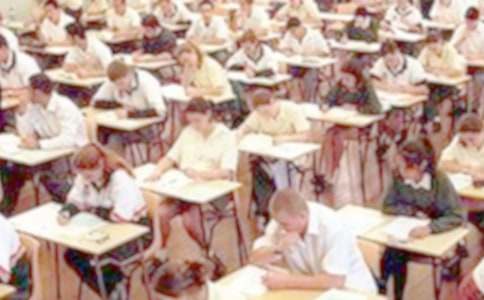- 相關(guān)推薦
2017年英語CET-6考試復(fù)習(xí)試題及詳解
All things are difficult before they are easy. 凡事必先難后易。以下是小編為大家搜索整理2017年英語CET-6考試復(fù)習(xí)試題及詳解,希望能給大家?guī)韼椭?更多精彩內(nèi)容請及時(shí)關(guān)注我們應(yīng)屆畢業(yè)生考試網(wǎng)!

Directions: Read the following passages carefully. Then answer the questions or complete the statements in the fewest possible words (not exceeding 10 words).
Learning could not occur without the function popularly named memory. Constant practice has such an effect on memory as to lead to skillful performance on the piano, to recitation of a poem, and even to reading and understanding these words. So-called intelligent behaviour demands memory, remembering being a primary requirement for reasoning. The ability to solve any problem or even to recognize that a problem exists depends on memory. Typically, the decision to cross a street is based on remembering many earlier experiences. ?
Practice (or review) tends to build and maintain memory for a task or for any learned material. Over a period of no practice what has been learned tends to be forgotten; and the adaptive consequences may not seem obvious. Yet, dramatic instances of sudden forgetting can be seen to be adaptive. In this sense, the ability to forget can be interpreted to have survived through a process of natural selection in animals. Indeed, when one’s memory of an emotionally painful experience leads to serious anxiety, forgetting may produce relief. Nevertheless, an evolutionary interpretation might make it difficult to understand how the commonly gradual process of forgetting survived natural selection. ?
In thinking about the evolution of memory together with all its possible aspects, it is helpful to consider what would happen if memories failed to fade. Forgetting clearly aids orientation in time, since old memories weaken and the new tend to stand out, providing clues for inferring duration. Without forgetting, adaptive ability would suffer; for example, learned behaviour that might have been correct a decade ago may no longer be. Cases are recorded of people who (by ordinary standards) forgot so little that their everyday activities were full of confusion. Thus forgetting seems to serve the survival of the individual and the species. ?
Another line of thought assumes a memory storage system of limited capacity that provides adaptive flexibility specifically through forgetting. In this view, continual adjustments are made between learning or memory storage (input) and forgetting (output). Indeed, there is evidence that the rate at which individuals forget is directly related to how much they have learned. Such data offer gross support of contemporary models of memory that assume an input output balance. ?
Questions:
1. According to Para. 1, memory plays an important role in _________________________ .
2. We can obviously notice that over a period of no practice what has been learned tends to be forgotten from________________________________________________________________.
3. It seems that the author disagree to explain ____________________________________.
4. If memories failed to fade__________________________________________________ .
5. According to the assumption given in last Para, we don’t exactly know ______________ .
短文大意
本文對于人的記憶和遺忘功能一題,進(jìn)行了詳細(xì)的論述。文中指出,記憶對學(xué)習(xí),對智力活動(dòng),解決問題的能力,都起著重要的 作用。然而,遺忘功能也是功不可沒的。因?yàn)椋偃缬洃浟τ啦凰ネ耍说倪m應(yīng)能力將被削弱,人的日常生活行動(dòng)將會(huì)混亂。文章在最后,又引入了另一個(gè)有關(guān)記憶與遺忘之間關(guān)系的理論。
1.
【參考答案】learning, intelligent behavior and the ability to solve any problem?
【解題技巧】 將同類的內(nèi)容進(jìn)行歸納總結(jié),提取原話是解決本題的方法。
【詳細(xì)解答】 本題的答案散落在第一段中,我們可分別發(fā)現(xiàn):Learning could not occur without the function popularly named memory.(沒有這個(gè)通常被稱為記憶的功能,學(xué)習(xí)不可能進(jìn)行。)…So-called intelligent behavior demands memory.(通常所說的智力活動(dòng)需要記憶力。) The ability to solve any problem or even to recognize that a problem exists depends on memory.(解決任何問題的能力,甚至發(fā)現(xiàn)問題是否存在的能力,均有賴于記憶力。) 因此,將Learning, intelligent behavior, the ability to solve any problem提取出來,即可。
2.
【參考答案】dramatic instances of sudden forgetting
【解題技巧】 從既定的結(jié)果入手,尋找存在的條件是本題技巧。
【詳細(xì)解答】 問題問的是:根據(jù)什么,我們可以明顯看出一段時(shí)間不練習(xí),已學(xué)到的東西會(huì)逐漸遺忘。在第二段中,我們可以看到本題已知的結(jié)果:Over a period of no practice what has been learned tends to be forgotten.下面一句說的是and the adaptive consequence may not seem obvious.(而且這種自身適應(yīng)的后果看來并不明顯。)這一句離題更近了,下面就得到了答案:dramatic instances of sudden forgetting can been seem to be adaptive.
3.
【參考答案】how the process of forgetting survived by evolutionary interpretation
【解題技巧】 從間接的否定進(jìn)入直接的否定,并拋開原文中不必要的修飾詞。
【詳細(xì)解答】 問題是:作者似乎不同意解釋什么。這句話的問題很明確。然而,在英語語言中,一些表示否定的話語,說得卻很委婉。第二段的最后:Nevertheless, an evolutionary interpretation might make it difficult to understand how the commonly gradual process of forgetting survived natural selection.然而,一個(gè)進(jìn)化論的解釋也許使人難以理解這個(gè)很普通的逐漸遺忘過程怎樣會(huì)經(jīng)歷自然選擇后仍保留下來。那么,might make it difficult,即是一種委婉的否定。因?yàn)槭呛喍袒卮穑梢园研揎椩~commonly, gradual, natural selection去掉,留下詞干就可以了。
4.
【參考答案】adaptive ability would suffer
【答題技巧】 尋找與題相關(guān)的類似說法,是本題的技巧。
【詳細(xì)解答】 第三段句首有這樣一句話:In thinking about the evolution of memory together with all its possible aspects, it is helpful to consider what would happen if memories failed to fade.文中有:Without forgetting, adaptive ability would suffer.在這句中,without forgetting取意與if memories failed to fade相同。
5.
【參考答案】how adjustments are made between memory and forgetting
【解題技巧】 根據(jù)已知的東西去推測判定隱含的內(nèi)容。
【詳細(xì)解答】 這個(gè)問題問的是:依據(jù)最后一段,給出的假定理論,我們知道什么。這種問題,需要我們依據(jù)文中內(nèi)容來作出合理的推測,最后一段指出:In this view, continual adjustments are made between learning or memory storage and forgetting.依據(jù)這種觀念(假定中的觀點(diǎn)),學(xué)習(xí)或記憶儲(chǔ)存和遺忘之間可不斷調(diào)整。Indeed, there is evidence that the rate at which individuals forget is related to how much they have learned.的確,有證據(jù)表明:一個(gè)人的遺忘率與他的學(xué)習(xí)量直接有關(guān),根據(jù)已知的信息,可做以下合理的判斷:一個(gè)人遺忘率與學(xué)習(xí)量雖然有關(guān),但是個(gè)什么樣的關(guān)系? 再由具體推向抽象,記憶與遺忘可不斷調(diào)整,怎么調(diào)整?據(jù)此,我們利用原文,答案可總結(jié)為:how adjustments are made between memory and forgetting.
【英語CET-6考試復(fù)習(xí)試題及詳解】相關(guān)文章:
英語專四閱讀考試題型詳解沖刺練習(xí)08-13
英語六級考試聽力試題調(diào)整詳解07-07
英語四級閱讀理解考試模擬試題及答案詳解09-20
小升初英語試題復(fù)習(xí)精選06-08
專業(yè)英語八級考試復(fù)習(xí)題詳解201707-17
2017年商務(wù)英語中級考試復(fù)習(xí)鞏固試題10-19
大學(xué)CET-6語法詞匯模擬試題07-31